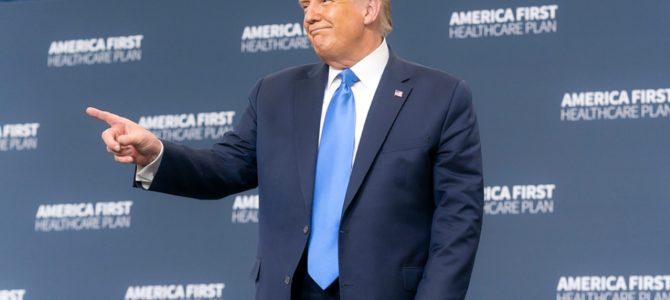
In the immortal words of Yogi Berra, it’s déjà vu all over again. In a speech on health care last Thursday afternoon, President Trump announced that seniors would receive discount cards to help with their prescription drug expenses:
The America First Healthcare Plan includes another historic provision to benefit our great seniors. Under my plan, 33 million Medicare beneficiaries will soon receive a card in the mail containing $200 that they can use to help pay for prescription drugs. Nobody has seen this before. These cards are incredible. The cards will be mailed out in the coming weeks.
Except that seniors have seen this before. For starters, the 2003 Medicare prescription drug law created a drug discount card program for 2004 and 2005 (before the Part D benefit started in January 2006) that included $600 payments to low-income seniors to subsidize their prescription drugs.
But in granting election year largesse to seniors, and in legally questionable ways, Trump most resembles the behavior of his immediate predecessor, Barack Obama.
Obama’s Election Gambits
The Obama administration propounded not one but two separate programs designed to persuade seniors with “goodies” before federal elections. To provide an immediate benefit after Obamacare’s enactment in 2010, Section 3315(a) of the law created a $250 rebate for seniors to help with their prescription drug costs that year.
The rebates only applied to about 4.5 million seniors who faced cost-sharing in the Medicare Part D “doughnut hole,” rather than all seniors in the Trump plan, but it applied the same principle: Showing seniors that the administration had “delivered” by lowering their drug costs. That said, if created as a political maneuver to help Democrats, the gambit didn’t work — the party lost 63 seats in the House, and 6 in the Senate.
As Democrats were losing control of the House in November 2010, the Obama administration implemented a separate program to protect Obama’s standing with seniors. Democrats paid for Obamacare in large part by reducing Medicare spending, particularly spending on Medicare Advantage plans. But reducing spending on these plans could have caused the private insurers who provide them to reduce their service areas, or get out of Medicare Advantage altogether.
Millions of seniors losing Medicare Advantage plans would have posed a major obstacle to Obama as he ran for re-election. Obama had, of course, promised that “If you like your plan, you can keep it,” and mass cancellations of Medicare Advantage plans would have exposed what in 2013 became PolitiFact’s “Lie of the Year.”
Instead, the Obama administration created an $8 billion “demonstration project,” ostensibly designed to evaluate whether payments to Medicare Advantage plans based on their star ratings improved care quality. Ultimately, however, policymakers recognized the program for what it was: A bailout in every sense of the term — throwing money at insurers so they wouldn’t expose Obama’s false promises while he ran for re-election.
The Government Accountability Office conducted multiple reviews of the Medicare Advantage demonstration project and noted the cost of the project “dwarfs all other Medicare demonstrations…in its estimated budgetary impact and is larger in size and scope than many of them,” while further questioning “the agency’s legal authority to undertake the demonstration.” Yet, while the GAO auditors effectively called Obama’s move illegal, the demonstration program remained in effect, and Obama won re-election.
Trump’s Giveaway
Fast-forward to last week, when Trump announced the discount card program. The administration said the plan would employ the same section of the law that Obama cited for his demonstration project: Section 402 of the Social Security Act amendments. It could well lead to GAO audits — this time requested by Democrats, not Republicans — concluding that the Trump administration exceeded its statutory authority with the program.
Unlike the Obama administration, which made no attempt to pay for its giveaway to Medicare Advantage insurers, the Trump administration claims that the savings for the demonstration will come from the president’s plan to impose “most favored nation” payment limits (more properly understood as price controls) on prescription drugs within Medicare. But while the administration has proposed a framework for this drug pricing mechanism, it has not yet put those rules into effect. Moreover, the rules will face an almost-certain legal challenge when they do become final, meaning the supposed mechanism to pay for the drug discount cards could never materialize.
Press reports also suggest that Trump’s announcement came after the pharmaceutical industry refused a request to send out the discount cards. When the administration tried to negotiate an alternative to its proposed payment limits, pharma balked at what it viewed as a political condition to the agreement: The industry sending out discount cards before the election.
Bad Medicine
For all the claims about how his administration has shattered norms, on this front Trump looks very much like the American president who came before him: Stretching the law to give seniors “goodies” that suit his political objectives. That does not absolve either man for their behavior — far from it. Instead, it means both Obama and Trump view policy through the prism of using other people’s money to win votes — actions antithetical to conservative principles.









